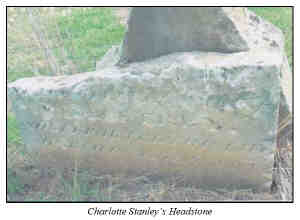|
|

Charlotte Stanley (1810-1853) |
Charlotte Stanley
Research Notes: Brian Kelly notes: Noted events in her life were: • Newspaper Story. Charlotte married Richard Coleborne Edsall in 1825 in St Matthews C of E, Windsor, Sydney, NSW Australia. (Richard Coleborne Edsall was born in 1780 in Fordingbridge, Hampshire England and died in 1853 215.) Charlotte next married George Erby on 10 Jul 1833 in All Saints C of E, Sutton Forest, NSW Australia.215 (George Erby was born in 1794 in Oxfordshire England and died on 21 Apr 1862 215.) |